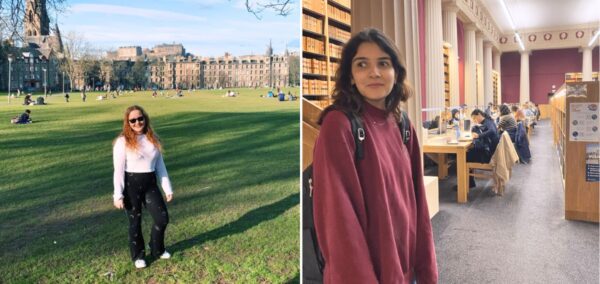
These London students are suing their unis for refunds over disruptions since Covid
‘We should have been compensated from the start’
It’s hard being a university student in London. Rent in most student areas has surged over £2,000 per month, and that’s just one part of the outrageous cost of living here.
Most of these you pay for while finding some twisted comfort in their necessity. But students whose programmes went through the height of the pandemic have to sit with the fact that their tuition only got them an “education” of recorded lectures and “live classes” where professors talk to a whole screen of black squares. And these were when the constant strikes didn’t disrupt teaching.
While many London students have been calling for compensation, actual administrative processes of requesting refunds have been described as “designed to frustrate complainants into defeat.” The London Tab previously reported that only 22 per cent of UCL students who applied for a tuition fee refund due to Covid were successful.
Maybe this is why many students, including over 3,500 at UCL alone, decided to bring their demands to the courts.

Tia wore an “I want a Refund” banner to their UAL graduation last summer to “shine a light on the discussion of compensation for students during the Covid era.” They are also suing the uni over “a very lacklustre degree.” (Credit: Tia O’Donnell)
It impacted my studies ‘one thousand per cent’
Student Group Claim is a campaign helping students file group legal action against their universities for disrupted education during the pandemic. It bases its claim on the argument that universities breached their contracts with students, who pay tuition with the expectation to receive conventional university experiences like in-person lectures and regular access to libraries and labs.
These amenities were definitely not available to Jowita, who did her Master’s in crime and forensic science at UCL in September 2020.
Having chosen the Russell Group for its “vibes,” she didn’t expect to pay £6,000 more for less in-person teaching than her friends at other universities.
She thought the virtual instruction impacted her programme “one thousand per cent.”
“One of my modules was Crime Scene Investigation. A lab session for it would usually involve attending a mock crime scene and collecting evidence. When you have students dressed head to toe in PPE as per the requirement, the university could have run these investigations in-person in smaller groups rather than over Zoom.
“It was just awful trying to look for a blood stain or for hair through a camera. It was not realistic as you couldn’t move objects, and you would normally turn the place upside down if you were analysing a crime scene.
Overall, she found it “considerably more difficult studying in only an online environment” and said her grades were impacted as a result.

Credit: Jowita Maniak and Student Group Claim
Zhitong, a current UCL anthropology undergraduate student, had a similar experience with virtual teaching.
Having come from China for UCL’s “status as a renowned university,” Zhitong started his first year in 2020 despite knowing everything would be online. He said the university promised “a high quality of teaching to ensure the best experience possible” in the virtual environment, but he thought “this was not the case.”
Since classes are remote, he decided to attend them back home in Beijing. He said UCL promised to consider the time difference in his timetable, but he ended up with 5pm classes and 11pm seminars.
And that was on top of difficulties like being unable to participate in discussions due to technical glitches and language barriers.
He thought being remote affected his assessments: “In my film module, I could not sufficiently collaborate with London-based students as we could not physically meet. The film we produced was not of a high enough quality, meaning the final mark for our project was unsatisfactory.
“Additionally, in my biological anthropology module, I could not handle the specimens but could only look at pictures and 3D models instead.
“UCL did not compensate for my grades despite the lack of interactive learning.”

Credit: Zhitong Li and Student Group Claim
‘My whole world was turned upside down’
Beyond the academic impact, Zhitong thought the online environment affected his wellbeing.
“I found it challenging to interact and collaborate with other students. There were countless times when I could not get involved in discussions or felt embarrassed during tutorials because I couldn’t hear a word.
“My whole world was turned upside down. I could not socialise with my friends or family, my sleep was disrupted, and I even became unwell,” he said.
Jowita echoed this: “My induction was on Zoom, and I couldn’t tell you one person’s name apart from my lecturers. I had my graduation in July, and I didn’t recognise a single person from my course.
“I didn’t get to know any other students on my course as people had their cameras off on Zoom, and it’s extremely hard to recognise people from a small square. There was no course group chat that I know of, and UCL didn’t do anything to make it as realistic as possible. Group work was awkward, and you would be put into a breakout room with some people with their cameras off.
“It was very isolating,” she said.

Another factor affecting students’ wellbeing has been the financial pressure of attending university, which often worsened during economic changes since the pandemic.
A Queen Mary student who wanted to remain anonymous had to self-fund their tuition due to religious reasons. This meant they weren’t eligible for the Covid bursary as they weren’t supported by Student Finance.
They said: “When lockdown started to ease up, reaching my university fees deadline was not feasible as the pre-pandemic options of picking up a new part-time job or a summer placement were quite impossible considering the situation of the job market.
“The only help Queen Mary offered was pushing the deadline back a few months. The actual amount of the fees did not change, which is strange as you’d think the running costs of campuses were halted.
“This took a large mental toll on me as I had to pick up multiple jobs, sacrificing time and energy. I was restricted on spending on myself or even my family, and missing out on the university experience did not help.”
They said they “appreciate and respect” that they chose to attend university, but they “probably would have had second thoughts” if they knew Covid would happen beforehand.

These students are only a few of the over 50,000 UK students who signed up for Student Group Claim. The campaign promises that participating solicitors will help any student at a university during the pandemic sue for refunds.
Letters have already been sent to seven London unis to seek compensation for individual students, and a hearing next month will see the judge decide whether students from the same uni can sue their school together as a group.
In response to the legal actions, a UCL spokesperson told The London Tab: “During the Covid-19 pandemic, UCL prioritised the health and safety of our whole community and followed UK Government guidance. Our lecturers and support staff worked tirelessly to make our campus and all UCL premises as safe as possible and ensured that a high-quality academic experience was provided to students.
“Throughout, we kept all our policies and procedures under constant review and introduced an emergency no-detriment policy and package of support to aid our students’ wellbeing and academic progression.
“We are also committed to minimising the impact of industrial action to ensure students are not academically disadvantaged and are able to complete their studies and graduate on time.”
A spokesperson for Queen Mary, University of London responded specifically to the student’s comments: “Throughout the pandemic, we worked with our students to provide as much of the right range of support services as possible.
“This included two Covid-specific financial support schemes, which ran alongside our other bursaries and scholarships and were open to all undergraduate and postgraduate students fully enrolled on degree programmes in 2020/21. Students did not need to be funded through the Student Loans Company to qualify for these schemes, which we promoted heavily throughout the pandemic and regularly extended deadlines to help ensure students did not miss these opportunities.”
If you are experiencing emotional distress related to Covid or finances, Samaritans can be contacted by calling 116 123 and Mind by 0300 123 3393 at any time. Means of university-specific financial support can usually be found on Students’ Union websites, and free advice can also be accessed by calling Money Helper at 0800 011 3797.



















